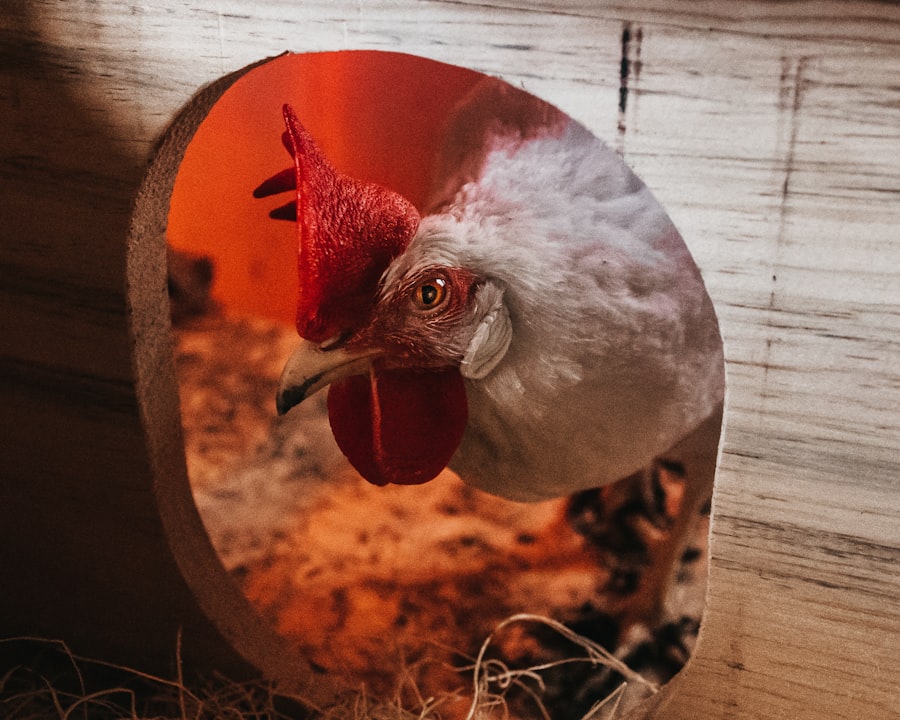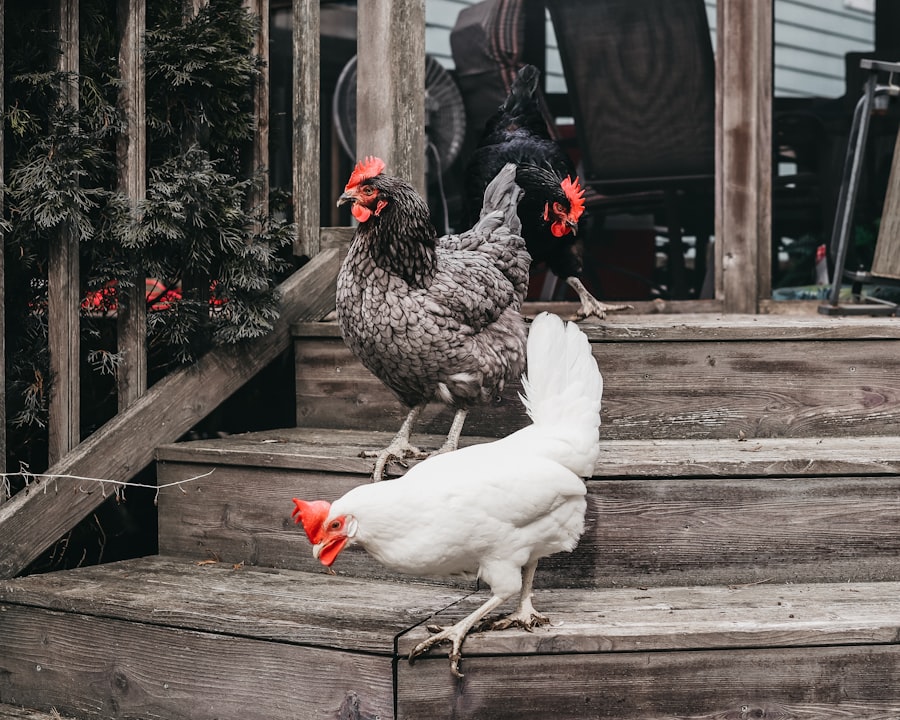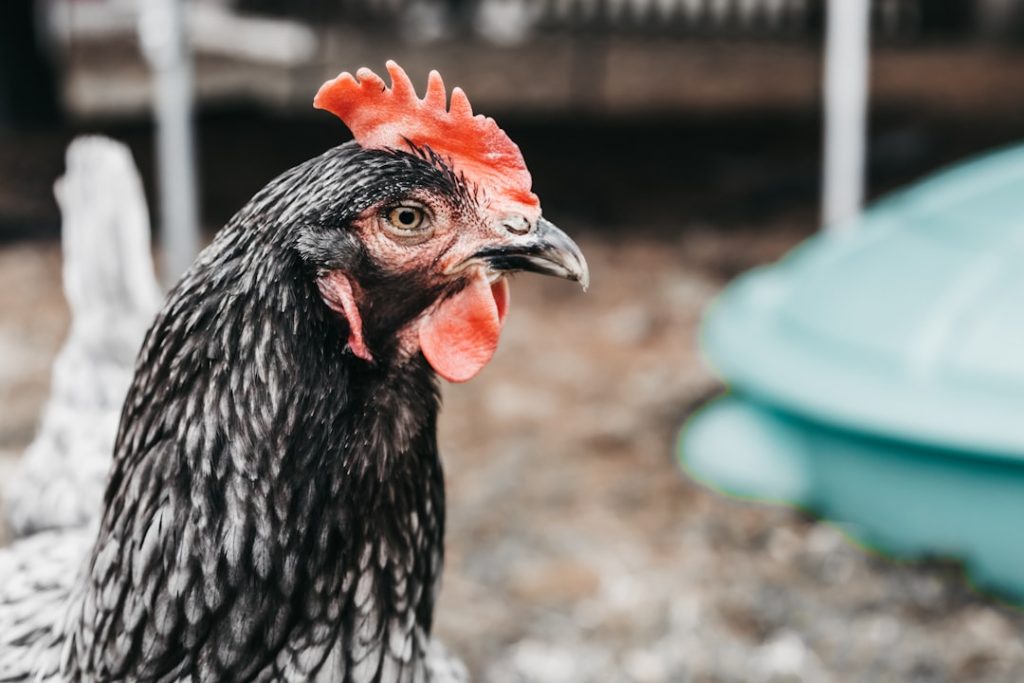When selecting chicken breeds for a backyard flock, several factors should be considered. Climate is a crucial aspect, as some breeds are better adapted to cold weather, while others thrive in warmer conditions. The purpose of the flock is another important consideration, whether it’s for egg production, meat production, or companionship.
Breeds like Leghorns and Rhode Island Reds are known for high egg production, while Cornish Cross and Freedom Rangers are suitable for meat production. Temperament is also significant, especially for families with children or other pets, as some breeds are more docile and friendly than others. Space availability in the backyard is another key factor.
Breeds such as Silkies and Bantams are well-suited for smaller spaces and confinement, while Sussex and Orpingtons are better for larger areas with free-range opportunities. Noise levels should also be taken into account, particularly in suburban settings with close neighbors. Some breeds are naturally quieter and less likely to cause disturbances.
When making a decision, it’s essential to research various breeds and their characteristics to find the best match for specific needs and circumstances. Factors such as egg color, feather appearance, and overall hardiness should also be considered. Consulting with local poultry experts or experienced backyard chicken keepers can provide valuable insights into which breeds perform well in a particular area.
Table of Contents
Key Takeaways
- Consider the climate, space, and purpose of raising chickens when choosing the right breed for your flock
- Ensure the coop and run setup provides enough space, ventilation, and protection from predators for the chickens to thrive
- Provide a balanced diet and clean water for the chickens to maintain their health and productivity
- Regularly check for signs of illness and maintain cleanliness in the coop to prevent the spread of diseases
- Collect eggs daily and handle them properly to ensure freshness and safety for consumption
- Implement security measures such as fencing and predator-proofing to protect the chickens from potential threats
- Familiarize yourself with local regulations and zoning laws related to raising chickens in your area to avoid legal issues
Coop and Run Setup
Designing the Perfect Coop
When designing or choosing a coop, it’s essential to consider factors such as ventilation, insulation, and predator-proofing. The coop is where your chickens will roost at night and lay their eggs, so it’s crucial to provide a comfortable and secure space for them.
Key Considerations for a Healthy Coop
Proper ventilation is vital to prevent moisture buildup and ammonia levels from rising, which can lead to respiratory issues in your chickens. Insulation is important for regulating temperature and keeping your chickens comfortable in both hot and cold weather. Additionally, it’s crucial to predator-proof your coop by using hardware cloth instead of chicken wire, securing all openings with latches or locks, and burying wire mesh around the perimeter to prevent digging predators from gaining access.
Creating a Safe and Engaging Run
In addition to a secure coop, it’s essential to provide your chickens with a run where they can safely exercise and forage. The size of the run will depend on the number of chickens you have and the space available in your backyard. As a general rule of thumb, each chicken should have at least 10 square feet of outdoor space in the run. It’s also important to provide shade and shelter within the run, as well as enrichment such as perches, dust baths, and toys to keep your chickens entertained and mentally stimulated.
Maintenance and Cleaning
Finally, it’s crucial to regularly clean and maintain both the coop and run to prevent the buildup of waste and bacteria that can lead to health issues for your flock.
Feeding and Watering

Feeding and watering your backyard flock is an essential part of keeping them healthy and happy. When it comes to feeding, it’s important to provide your chickens with a balanced diet that meets their nutritional needs. A good quality commercial feed formulated specifically for chickens is a great starting point.
You can choose from different types of feed depending on the age and purpose of your flock, such as starter feed for chicks, grower feed for young chickens, layer feed for hens, and broiler feed for meat birds. In addition to commercial feed, it’s important to provide your chickens with access to fresh greens, fruits, vegetables, and kitchen scraps as treats and supplements. This not only adds variety to their diet but also provides essential vitamins and minerals.
In addition to a balanced diet, it’s crucial to provide your chickens with access to clean and fresh water at all times. Chickens need constant access to water for digestion, temperature regulation, and overall health. It’s important to regularly clean and refill waterers to prevent the buildup of algae, bacteria, and other contaminants that can make your chickens sick.
In colder weather, it’s important to prevent water from freezing by using heated waterers or manually refreshing water throughout the day. Additionally, it’s important to provide multiple waterers in both the coop and run to ensure all of your chickens have access to water without having to compete with more dominant birds.
Health and Hygiene
Maintaining the health and hygiene of your backyard flock is essential for their overall well-being and productivity. Regular health checks are important for identifying any potential issues early on and preventing the spread of disease within your flock. When checking your chickens, it’s important to look for signs of illness such as lethargy, decreased appetite, abnormal droppings, respiratory issues, or changes in behavior.
Additionally, it’s important to regularly check your chickens for external parasites such as mites or lice, as well as internal parasites such as worms. If you notice any signs of illness or parasites, it’s important to consult with a veterinarian who specializes in poultry health for proper diagnosis and treatment. In addition to regular health checks, it’s important to maintain good hygiene within the coop and run to prevent the spread of disease.
This includes regularly cleaning out bedding material such as straw or wood shavings, removing waste from the coop and run, and regularly disinfecting surfaces with poultry-safe disinfectants. It’s also important to practice good biosecurity measures by limiting contact with other poultry flocks, quarantining new birds before introducing them to your existing flock, and preventing wild birds from coming into contact with your chickens. By practicing good hygiene and biosecurity measures, you can help prevent the spread of disease within your flock and keep your chickens healthy.
Egg Collection and Handling
If you’re raising chickens for egg production, it’s important to establish a routine for collecting and handling eggs to ensure they are fresh, clean, and safe for consumption. The frequency of egg collection will depend on the size of your flock and how often they lay eggs. In general, it’s best to collect eggs at least once or twice a day to prevent them from getting dirty or broken.
When collecting eggs, it’s important to handle them gently to prevent cracking or damaging the shells. It’s also important to promptly refrigerate eggs after collection if you don’t plan on using them right away. In addition to collecting eggs regularly, it’s important to keep nesting boxes clean and comfortable to encourage hens to lay eggs in them rather than on the ground.
This can be achieved by providing clean bedding material such as straw or wood shavings in nesting boxes and regularly cleaning out soiled bedding. It’s also important to regularly inspect eggs for any signs of abnormality such as cracks or unusual discoloration that could indicate a problem with the hen or her diet. By establishing a routine for egg collection and handling, you can ensure that your eggs are fresh, clean, and safe for consumption.
Predators and Security

Securing the Coop and Run
To protect your flock from these predators, it’s important to implement various security measures. These include securing the coop with hardware cloth instead of chicken wire, using locks or latches on all openings, burying wire mesh around the perimeter of the coop and run to prevent digging predators from gaining access, and installing motion-activated lights or alarms around the coop. Additionally, using guard animals such as dogs or geese can help deter predators.
Supervising Free-Range Time
In addition to securing the coop and run, it’s important to supervise free-range time if you allow your chickens to roam outside of their enclosed area. This can be achieved by supervising free-range time during daylight hours when predators are less active.
Additional Deterrents
Providing hiding spots such as bushes or shrubs where chickens can take cover if threatened by predators, and using deterrents such as noise makers or visual scare tactics can also help deter predators from approaching your flock. By implementing these security measures, you can help protect your backyard flock from potential predators and keep them safe.
Legal Considerations
Before starting a backyard flock, it’s important to familiarize yourself with any local laws or regulations that may apply to keeping chickens in your area. Some municipalities have specific zoning laws that dictate whether or not you can keep chickens on your property, as well as regulations regarding coop size, distance from neighboring properties, noise levels, waste management, and more. It’s important to research these laws before starting a backyard flock to ensure that you are in compliance with local regulations.
In addition to zoning laws, it’s also important to consider any homeowners’ association rules or covenants that may apply to keeping chickens on your property. Some homeowners’ associations have specific rules regarding livestock or poultry that may impact your ability to keep chickens in your backyard. It’s important to review these rules before starting a backyard flock and seek approval from the homeowners’ association if necessary.
By familiarizing yourself with any legal considerations that may apply to keeping chickens in your area, you can ensure that you are in compliance with local regulations and avoid any potential legal issues related to keeping a backyard flock. In conclusion, raising a backyard flock can be a rewarding experience that provides fresh eggs, natural pest control, and entertainment for the whole family. By carefully choosing the right breed of chickens for your backyard environment, setting up a secure coop and run, providing a balanced diet and clean water, maintaining good hygiene and health practices, establishing a routine for egg collection and handling, protecting your flock from predators, and considering any legal considerations that may apply in your area, you can create a safe and healthy environment for your backyard flock to thrive.
With proper care and attention, your backyard flock can provide years of enjoyment and productivity for you and your family.
If you’re interested in learning more about the basics of keeping chickens, you might also want to check out this article on chicken coop door size. Understanding the proper size for your coop’s door is essential for the safety and comfort of your flock. This article provides valuable information on how to determine the right dimensions for your chicken coop door.
FAQs
What are the basic requirements for keeping chickens?
Chickens require a secure and predator-proof coop, access to fresh water, a balanced diet of chicken feed, and a suitable outdoor space for foraging and exercise.
What type of housing do chickens need?
Chickens need a well-ventilated and dry coop with nesting boxes for laying eggs, perches for roosting, and adequate space for the number of chickens being kept.
What do chickens eat?
Chickens require a balanced diet of chicken feed that includes grains, protein, vitamins, and minerals. They also benefit from access to fresh greens, insects, and kitchen scraps.
How much space do chickens need?
Chickens need at least 2-3 square feet of coop space per bird, and a minimum of 8-10 square feet of outdoor space per bird for foraging and exercise.
What are some common health issues for chickens?
Common health issues for chickens include parasites, respiratory infections, and egg-laying problems. Regular health checks and good hygiene practices can help prevent these issues.
Do chickens require any special care during extreme weather conditions?
Chickens may require additional heat or insulation in the coop during cold weather, and access to shade and plenty of water during hot weather. It’s important to monitor their well-being during extreme weather conditions.
Meet Walter, the feathered-friend fanatic of Florida! Nestled in the sunshine state, Walter struts through life with his feathered companions, clucking his way to happiness. With a coop that’s fancier than a five-star hotel, he’s the Don Juan of the chicken world. When he’s not teaching his hens to do the cha-cha, you’ll find him in a heated debate with his prized rooster, Sir Clucks-a-Lot. Walter’s poultry passion is no yolk; he’s the sunny-side-up guy you never knew you needed in your flock of friends!







